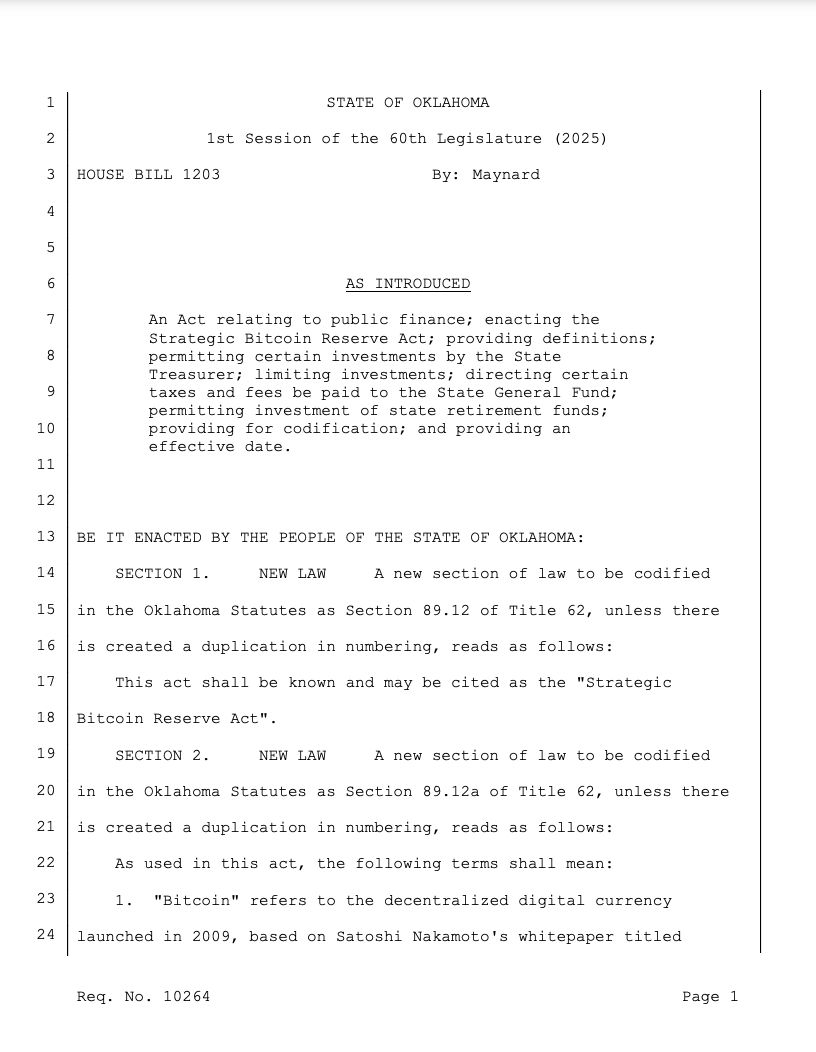According to news sources, on January 15, Oklahoma state Rep. Cody Maynard reportedly introduced the Strategic Bitcoin Reserve Act into the Oklahoma House of Representatives (House Bill 1203), a bill that would allow the state’s pension funds and savings accounts to invest a portion of the accrued funds in Bitcoin as a hedge against inflation and turmoil.
Rep. Maynard explained the bill like this:
“Bitcoin represents freedom from bureaucrats printing away our purchasing power. As a decentralized form of money, Bitcoin cannot be manipulated or created by government entities. It is the ultimate store of value for those who believe in financial freedom and sound money principles.”
This puts Oklahoma on the list of U.S. states that are considering Bitcoin as a core reserve asset as its role expands in both institutional and government portfolios.
Other States Enhance Bitcoin Reserves
Oklahoma’s proposal follows others in several U.S. states. Pennsylvania introduced its own Bitcoin strategic reserve proposal in November 2024. The bill’s sponsor, State Rep. Mike Cabell, said Bitcoin is a diversification tool, citing private sector asset managers like BlackRock and Fidelity that already use Bitcoin to hedge against macroeconomic risks.
“Bitcoin is a way to protect the purchasing power of states from inflation and through turbulent economic times,” Cabell said, explaining why states need to get creative with their finances.


December 12, 2024, Texas, another big player in the Bitcoin reserve movement, reportedly introduced the Texas Strategic Bitcoin Reserve Act. State Rep. Giovanni Capriglione filed a bill to have the state’s comptroller of public accounts hold Bitcoin as a reserve asset for at least 5 years.
North Dakota and New Hampshire weren’t far behind; on January 10, news sources also reported that they introduced their own Bitcoin strategic reserve legislation. New Hampshire’s bill uses the broader term “digital assets,” which may indicate diversification away from Bitcoin. Dennis Porter, co-founder and CEO of the pro-Bitcoin advocacy group Satoshi Action Fund, allegedly said the North Dakota bill already has 11 co-sponsors.
Bitcoin Adoption Trend
The number of Bitcoin strategic reserve proposals going live in the U.S. reflects the growing recognition of cryptocurrencies as inflation hedges and financial stabilizers. This coincides with the asset’s entry into institutional investors’ consideration as a hedge against economic turmoil.


Oklahoma has put its hat in the ring. Now, it’s part of a broader movement to get cryptocurrency into state-level financial plans and public sector adoption.
Conclusion
The Oklahoma Strategic Bitcoin Reserve Act is years in the making at the state level for Bitcoin adoption. By investing in Bitcoin as a hedge against inflation and economic turmoil, Oklahoma is following the national trend. The more states that introduce proposals, the more Bitcoin gets into institutional portfolios.
Stay updated with Deythere as we’re available around the clock, providing you with updated information about the state of the crypto world.
FAQs
1. What is the Oklahoma Strategic Bitcoin Reserve Act?
The Strategic Bitcoin Reserve Act is a bill to allow Oklahoma’s pension funds and savings accounts to invest in BTC as a hedge against inflation and economic risks.
2. Which other states have proposed Bitcoin reserves?
Pennsylvania, Texas, North Dakota and New Hampshire have also introduced similar bills-which means Bitcoin is becoming a more strategic reserve asset.
3. Why would states consider Bitcoin reserves?
States see BTC as a way to protect purchasing power from inflation, diversify their financial assets, and reduce macroeconomic risk.
4. Why is Bitcoin a good inflation hedge?
It is believed to be decentralized, limited supply and government resistant.












